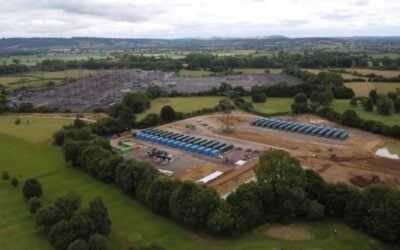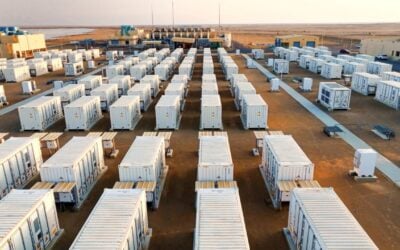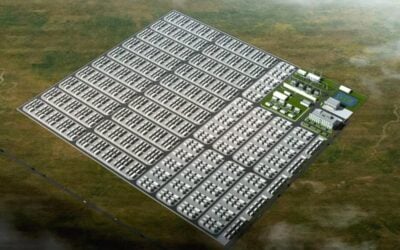UK minister visits Cumulus in California to investigate cost-effective energy storage
Amber Rudd visited Cumulus Energy Storage in California. credit: Cumulus
UK secretary of energy and climate change, Amber Rudd, has visited Tesla, the US office of UK battery developer Cumulus Energy Storage and the Lawrence Berkeley National Laboratory in California, to investigate how to create a cost-effective commercial pipeline of energy storage technologies in the UK.
Enjoy 12 months of exclusive analysis
- Regular insight and analysis of the industry’s biggest developments
- In-depth interviews with the industry’s leading figures
- Annual digital subscription to the PV Tech Power journal
- Discounts on Solar Media’s portfolio of events, in-person and virtual
Rudd’s visit to the San Francisco Bay Area comes after California became the first US state to mandate energy storage, having set a target of 1.3GW by 2020.
Cumulus Energy Storage, which uses copper and zinc technology to make batteries for long duration energy storage markets including commercial-scale renewable energy generation and intensive industries, not only has R&D facilities in Oakland, California, but is also developing battery manufacturing in Sheffield in the UK.
The UK government awarded £800,000 to Cumulus Energy Storage in 2014 to work on developing a grid-connected battery. This resulted in the leveraging of a further £1.4 million equity finance. Cumulus is raising funds for a 1MWh per month pre-production pilot line and plans to raise a further £25 million for full production of 500MWh-1GWh energy storage batteries each year in 2018.
A Cumulus release said that several energy storage companies in the UK are ready for match-funded demonstration projects to prove their technology at a commercial level and the UK’s Department of Energy and Climate Change (DECC) can use its innovation fund to aid these projects.
Rudd said: “We are tackling a legacy of under-investment and building a system of energy infrastructure fit for the 21st Century, and I want to see storage play a big role in that. Cumulus’s innovative work on energy storage, supported by government funding, will help to develop this technology of the future, driving energy efficiency, unlocking skills and creating jobs.”
A blog earlier this year from David Hunt of UK-based specialist recruiter Hyperion Executive Search asked “How many solar jobs in Britain will be saved by energy storage?”. Hunt and Andrew Bissell of Sunamp appear in a discussion on UK energy storage and clean energy in an Energy Storage News video interview published yesterday.
“
We are tackling a legacy of under-investment and building a system of energy infrastructure fit for the 21st Century, and I want to see storage play a big role in that.” Amber Rudd, UK secretary of state for energy and climate change.
Saft doubling production capacity by opening new facility in China
Credit: Saft
France-headquartered battery producer Saft has doubled its production capacity by opening a new facility in Zhuhai, China, in order to cater for the continued increase in market demand in Asia.
Saft’s original facility, constructed in Zhuhai in 2006, mainly produced lithium-based batteries of various sizes for the Chinese metering market. Following growth in the Chinese rail market, it started to include nickel-based battery systems, and produced its 100 millionth battery in 2014.
A Saft release claims it became harder to meet customer demand in recent years despite several capacity expansions and the ability to produce 30 million lithium batteries per annum.
As a result the firmed decided to move to a larger facility, which required an investment of EUR5 million (US$5.7 million) in order to double production capacity from 30 million to 60 million batteries per year by the third quarter of this year. The area available has been quadrupled from 3,000 m² to 12,000 m², with space reserved for future growth into other energy storage and electric vehicle markets. Capacity has already been increased to 40 million lithium cells per year.
Ghislain Lescuyer, Saft’s chairman of the management board, said: “The opening of this new facility in Zhuhai represents a new milestone in the implementation of our long-term growth strategy in Asia, and illustrates our success and our ambitions in this region. By offering reliable, high-quality products which meet growing structural needs, notably in key markets like smart meters and rail transport, we are wholly fulfilling our role as solutions provider to leading Chinese groups, to whom we have now become a key partner”.
Saft will soon also provide grid-balancing batteries for a large-scale battery park at a 10MW PV farm in Puerto Rico.
Fluidic Energy signs MoU with Madagascar government for remote smart grid solutions
Fluidic’s smart grid and energy storage solutions will help power 400,000 remote villagers. Flickr: Frank Vassen
Arizona-based energy storage provider Fluidic Energy has signed a memorandum of understanding (MoU) with the government of Madagascar to provide mini-grids to 100 remote rural villages and communities on the island.
The projects, based on renewable energy generation and integrated smart grid technology, will provide electricity for 400,000 people who do not currently have access to power. A total of 7.5MW of solar PV will be used alongside 45MWh of Fluidic Energy’s energy storage systems using pre-pay billing.
Fluidic Energy uses rechargeable metal-air battery technology, which can be used for commercial load-shifting applications. However, metal-air battery technology is also considered a very low cost way of storing an electron, helping to reduce energy costs as a whole.
The firm is also considering setting up manufacturing infrastructure in Madagascar to support the new project.
Steve Scharnhorst, chief executive of Fluidic Energy, said: “This type of rural electrification project is an outstanding example of how Fluidic Energy and our partners can impact the communities and people we serve. Not only are we positively impacting the lives of more than 400,000 people by providing a stable source of renewable based energy, we are also creating sustainable jobs, education, and opportunities in the communities impacted.”






